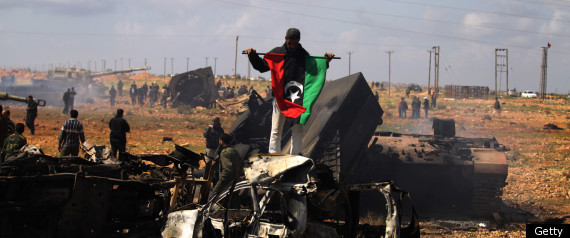Sunday, March 20, 2011
As Libya Air Strikes Intensify, What Next For The United States?

Having failed to dislodge Gaddafi from power with a "shock and awe" barrage of cruise missile attacks and air strikes Saturday and Sunday, the United States and its European partners are left with the prospect of an extended air campaign with uncertain prospects of success and a growing risk of civilian suffering. Nor does the U.S. have any clear military option of escalation: in effect, the United States is boxed in by a U.N. Security Council resolution that authorizes “all necessary measures’’ to protect Libyan civilians -- "excluding a foreign occupation force."
So far, the allied air attacks -- as of Sunday afternoon, no Arab nations have taken part -- have had "a pretty significant effect," Adm. Mike Mullen, chairman of the Joint Chiefs of Staff, insisted Sunday, as he made the rounds of the TV talk shows. Mullen said the attacks are "narrow and focused" on a mission confined to protecting Benghazi, the last major rebel hold-out, and opening routes for humanitarian aid
But he declined to say how long the campaign might take or how it might be escalated to dislodge an unrepentant Gaddafi, the ultimate goal announced by President Obama Feb. 26 that the Libyan leader must step down.
"We're not retreating anywhere," Gaddafi boasted on a radio broadcast Sunday, taunting the western military coalition. "You are going to return defeated."
The air and missile attacks, joined Sunday by Marine Harrier strike fighters from the strike carrier USS Kearsarge in the Mediterranean, are targeting purely military targets, and as the conflict continues, Gaddafi reportedly is moving more of his assets into schools and mosques, knowing that the U.S. won’t attack for fear of causing civilian casualties.
And he retains an unnerving ability to retaliate. With his long experience with terrorism, he could launch terrorist attacks inside Benghazi without exposing his tanks and artillery to allied air strikes. He might threaten to use his stockpiles of mustard gas on civilians unless the U.S. backs off. And he might authorize terrorist strikes against Americans and other civilians in Europe -- as he has done many times before.
Gaddafi "will fight until the end," said Ali Suleiman Aujali, who was Gaddafi’s ambassador in Washington until he defected earlier this month. He told ABC’s Christine Amanpour Sunday that Gaddafi "has no other choice. He has no shelter to go. And this is his -- his attitude. He will never give up."
Much on the minds of Obama administration officials and others is Gaddafi’s record of deadly attacks on civilian aircraft, including the 1988 bombing of Pan Am flight 103, which killed all 270 people on board, and the bombing a year later of a UTA flight over Niger, killing all 171 on board. Both of those attacks followed the U.S. air strikes against Tripoli ordered by President Reagan in 1986.
Obama held a secure conference call Sunday with his national security team, including adviser Tom Donilon, Secretary of State Hillary Clinton, Pentagon chief Bob Gates, and Army Gen. Carter F. Ham, who is directing the operation as commander of U.S. Africa Command.
Their dilemma eerily reflects the NATO air war against Yugoslavia’s Slobodan Milosevic more than a decade ago, which took 78 days of bombing to bring to a conclusion. Even then, analysts believe the bombing was not instrumental in convincing Milosevic to give up.
Called Operation Allied Force, the 1999 Yugoslav air war -- like the current operation against Libya -- was envisioned as a quick strike against a militarily weak force. But the NATO campaign led by the United States quickly bogged down, hampered by "a surprisingly resilient opponent" in Milosevic, according to a thorough post-war analysis by Benjamin Lambeth, a senior air analyst at the RAND Corporation. In another lesson for those in charge of Operation Odyssey Dawn against Libya, the allies were hampered by "sharp differences of opinion" about how to proceed, especially on whether to use ground forces to put further pressure on Milosevic, Lambeth wrote.
When the Yugoslav leader eventually did give up, it was as much because Russia had withdrawn its support, and because an impatient U.S. was taking initial, hesitant steps to deploy ground troops into Yugoslavia.
No such options seem to exist at the moment. But one factor weighs heavily against Gaddafi: Virtually all of his Arab and North African neighbors are united against him. With good reason: At one time or another over the past decades, Gaddafi has directed terrorist attacks against almost all of them.
#########################################################
Libya May Lash Out With Terrorist Attacks, U.S. Official Says »
The New York Times | ERIC SCHMITT | March 18, 2011 at 09:11 PM
The United States is bracing for possible Libyan-backed terrorist attacks, President Obama's top counterterrorism official said on Friday.
Subscribe to Comments [Atom]

First Posted: 03/20/11 03:21 PM Updated: 03/20/11 03:21 PM